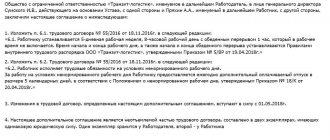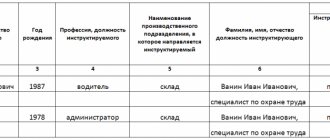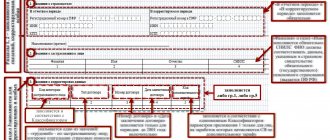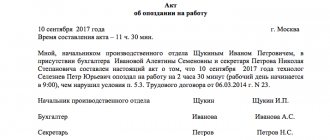Sample request for a written explanation
There is no single, mandatory form in which a requirement for an employee to provide explanations should be drawn up.
Therefore, the employer makes such a requirement in any form. The request must indicate why written explanations are being requested from the employee, as well as the period given to the employee to provide such explanations. For example, before applying a disciplinary sanction, an explanation must be given by the employee within two working days following the day the request was received (Part 1 of Article 193 of the Labor Code of the Russian Federation). Considering that in some cases the employer is obliged to demand an explanation from the employee, failure to comply with this procedure may be regarded as a violation of labor legislation. That is why the employer must confirm the fact that explanations were requested from the employee. This can be done by familiarizing the employee with such a requirement, where the employee puts his signature. Or, if the employee refuses to sign for familiarization with the requirement, such a requirement can be sent to the employee at his place of residence, confirming the fact of sending with a list of the attachment and a notification of delivery. Another option for making the employee aware of the request when he does not want to withdraw it is to read out loud the request for an explanation. In this case, this must be done in the presence of witnesses (commission), about which a corresponding act is drawn up.
For a request for explanations, we provide a sample of how to fill it out.
Prev. / Next
If, after the expiration of the period provided for giving explanations, the employee has not provided such explanations, an act of refusal of the employee to give explanations is drawn up. Failure by an employee to provide explanations is not an obstacle to either applying a disciplinary sanction or collecting damages from the guilty employee (Part 2 of Article 193, Article 247 of the Labor Code of the Russian Federation).
Explanatory note for being late for work
Then you can take an example of drawing up a contract from our website. However, you will still have to make changes to it according to your terms of the deal. Much will be determined by the type of product and the amount of the transaction.
https://youtu.be/EaAjBNGHsls
Despite the simplified procedure for dismissal during the probationary period, many of them simply do not want to burden themselves with the need for explanations with the employer. This category also includes single men who are in their thirties and have a craving for strong drinks or gambling.
From January 1, 2020, the Labor Code of the Russian Federation prohibits agency work. Can an entrepreneur now use the labor of hired personnel? An employee who receives a written explanatory request from the employer must respond to it. And this does not depend on which of the two options he decided on: to write a note or not to do it. If an employee does not want to write an explanation, he must tell his boss about it.
How to apply if there is a good reason?
It is necessary to inform your superiors about your planned absence from work, otherwise it may be perceived as absenteeism.
In order to notify the employer of the need to be absent from the workplace for a valid reason, it is necessary to draw up a special statement.
It is drawn up in free form; there is no need to use any generally accepted forms.
Exceptions are situations when the company has developed special sample statements of this nature.
The header of the application contains standard information - full name and position of the addressee, originator, name of the organization.
In some companies, documentation is issued in the name of the general director, in others - in the name of the employee’s immediate supervisor.
After the header, the full name of the application is indicated, reflecting its essence.
The main part of the paper includes the employee’s address, which usually begins with the words “I ask you.” The essence of the request is stated below.
If there is documentation confirming the need for absence from the workplace, a corresponding note is made in the application, and the paper is attached to the application.
In such a situation, the likelihood of its approval increases significantly. Such papers can be a referral from a medical specialist, an extract from an outpatient card, etc.
The application must also indicate the date of the expected absence. At the end, the employee puts his personal signature and its transcript.
for family reasons
statements of absence from work for family reasons – word.
Example if an employee needs to leave for a few hours
A statement of absence from work can also be drawn up if an employee needs not a day, but several hours of time off.
In such cases, documentation is prepared in a standard manner.
Changes are made only to its main part.
It is important to accurately reflect in it what hours the employee needs to be absent.
This period can occur either at the beginning or at the end of the working day.
If such a need arises, the application should indicate not only the date, but also the time of absence. For example, from 12.00 to 15.00.
statements about the need to be absent from work for 2 hours – word.
What to do if the employer refuses to accept the application
It is possible that a situation may arise in which the manager does not accept an application for absence from work. In this case, the employee can take several measures.
An employee is required to be given time off if he takes it out for the purpose of donating blood.
This is not only a noble act, but also an opportunity to get 2 additional days off, which the employer has no right to refuse.
These are the day of blood donation itself and the day following it. This period is subject to mandatory payment.
Also, Article 128 of the Labor Code of the Russian Federation establishes that the manager is obliged to remove an employee from performing official duties if such a need is related to:
- marriage registration;
- the birth of a child;
- the death of loved ones.
In addition, the following categories of workers have the right to be absent from work:
- working pensioners;
- WWII veterans and combatants;
- spouses and parents of law enforcement officials.
Useful video
In what cases does an employer have no right to refuse to provide leave without pay and what are the terms of provision according to the law, are described in detail in this video:
The law prescribes
In Art. 57 of the Federal Law No. 90-FZ, Art. 192 and 193 of the Labor Code contain instructions that regulate the actions of the employer in requesting written explanations from employees who have committed unlawful acts and are guilty of not fulfilling their labor duties, violating labor discipline and labor regulations provided within the enterprise. Constitution of the Russian Federation in Art. 27 notes that the employee has the right to write an explanatory note, which cannot relate to the duty.
If an employee violates labor discipline by not performing or performing labor duties improperly, then the employer, by law, has the right to apply disciplinary punishment to him.
The measure of responsibility for the offense committed is classified as:
- remark, often made orally;
- a reprimand, depending on the aggravating circumstances, it is presented orally or in writing;
- dismissal from work with appropriate wording on the grounds specified in regulations and the Labor Code.
But, before exercising the right to impose a disciplinary sanction, the employer is obliged to request from the employee an explanation explaining the basis of his action, which led to violations of the rules of labor conduct, verbally or in writing.
A written explanation is used only in some cases, for example, if the validity of the reasons that formed the basis of his duty and led to a violation of labor discipline is assessed. In each specific case of an offense, it is necessary to carefully understand it, therefore the explanatory note argues for the details, explains the details of what was done and brings to the attention of management the employee’s opinion and his ability to analyze the current situation.
If the employee does not provide an explanatory note within two working days, then, in accordance with the instructions of the current legislation, a statement of failure to submit is drawn up, which will not become an obstacle to the application of suitable disciplinary punishment by the employer.
The number of personnel should be calculated based on feasibility. See how to create a staffing schedule for a construction organization. The manager's reference for awards must contain positive information. Read more in the article.
Circumstances
The employee is obliged to explain the reasons that prompted him to commit this or that offense associated with failure to comply with the requirements for fulfilling official duties.
The circumstances are different, but they all lead to a certain type of violation of labor discipline and routine:
- being late for work for a good or bad reason, the reason must be clearly defined;
- failure to fulfill direct functional duties or their performance not in accordance with the requirements of the duties, for example, the work is performed poorly and therefore does not bring good results;
- absence from work during working hours without appropriate documents justifying his misconduct; a medical certificate certifying the employee’s illness can serve as an exculpatory document;
- damage to the employer’s property associated with negligence in the performance of work duties;
- failure to fulfill an order issued by the employer, which is not part of the direct duties of the employee;
- being at work in a state of intoxication from the influence of alcohol, drugs and toxic substances, which will entail failure to fulfill accepted obligations to comply with labor safety rules;
- failure to provide reliable information about the production activities of the enterprise to senior management, which leads to economic violations;
- in case of violation of life safety rules provided for at the enterprise.
Regardless of the circumstances, when an employee provides supporting documents attached to the explanatory note, the decision that is made in connection with the offense is mitigated.
Who has the right to request?
According to the current laws and provisions of the Labor Code of the Russian Federation, only the employer has the right to request an explanatory note. He must hold the position of the head of the enterprise or a person authorized by the head, approved by order of the enterprise for a certain period.
The requirement to write an explanatory note is an integral part of engaging an employee to comply with disciplinary liability in the workplace and on the territory of the enterprise.
The explanatory note helps the employer to find out the circumstances due to which the offense was committed and the degree of guilt of the employee. The employer, realistically assessing the situation, makes a decision on the appropriate disciplinary measure and the need to take it.
Is the employee required to answer?
The employee has the right to refuse to write an explanatory note because it directly or indirectly confirms his guilt. But often the best option may be to provide an explanatory note to avoid more severe punishment in the form of fines or dismissal from work.
An employee who receives an official letter notifying him of the requirement to provide an explanation responds to it regardless of which decision he chooses: “to write an explanatory letter or not.”
If he is not going to write it, he must notify the employer of the refusal. In any case, refusal to write an explanatory note is not considered an offense.
Notice of absence from work
Timely payment of wages at least every half month is the responsibility of the employer (part 2 of article 22, part 6 of article 136 of the Labor Code of the Russian Federation).
Accordingly, one of the basic rights of workers is the right to timely and full receipt of wages in accordance with their qualifications, complexity of work, quantity and quality of work performed (Part 1 of Article 21 of the Labor Code of the Russian Federation).
Late payment of wages threatens the employer and his officials with, at a minimum, administrative liability in the form of a fine (Part 6 of Article 5.27 of the Code of Administrative Offenses of the Russian Federation):
- for officials - from 10,000 to 20,000 rubles;
- for an individual entrepreneur – from 1,000 to 5,000 rubles;
- for an employer-organization - from 30,000 to 50,000 rubles.
For repeated delays in payment of wages within a year, the amount of fines increases, and this even threatens the manager with disqualification (Part 7, Article 5.27 of the Code of Administrative Offenses of the Russian Federation).
In addition to administrative liability, the employer has the obligation to pay the employee monetary compensation for each day of delay in the amount of no less than 1/150 of the current Central Bank key rate of the salary debt (Article 236 of the Labor Code of the Russian Federation). By the way, our Calculator will help you calculate compensation for delayed salary payments.
In case of a long (more than 15 days) delay in the payment of wages, the Labor Code of the Russian Federation gives employees the right to suspend work until the debt is fully repaid. To do this, it is enough for employees to notify the employer of their intention in writing (Part 2 of Article 142 of the Labor Code of the Russian Federation). We will tell you how to draw up such a notice in our consultation.
We draw up a notice to the employer about absence from work
A notice of a delay in wages and a decision made in connection with this not to go to work is drawn up in any form.
It is addressed to the head of the employer and contains reference to Part 2 of Art. 142 of the Labor Code of the Russian Federation indicates that due to a delay in wages of more than 15 days, the employee suspends his work until the debt is paid. The notice must indicate the date from which the employee suspends work.
Let us remind you that during the period of suspension the employee has the right to be absent from his workplace (Part 3 of Article 142 of the Labor Code of the Russian Federation). If the employee wishes to take advantage of this opportunity, this should also be indicated in the notice.
As background information, the notice can include the date the debt arose, the amount of the debt, and the number of days the payment is overdue.
Let us remind you that during the period of suspension of work, the employee retains his average earnings (Part 4 of Article 142 of the Labor Code of the Russian Federation).
The employee needs to confirm the date of receipt of the notice by his employer. Therefore, either the application must be marked with acceptance by the responsible person of the employer, or the notification can be sent by registered mail with a list of the contents and a receipt. After all, if you do not confirm that the employer was notified in writing about the suspension, the employee who was absent from work may be fired for absenteeism (clause “a”, clause 6, part 1, article 81 of the Labor Code of the Russian Federation).
At the same time, you need to remember that suspension of work is not allowed, in particular (Part 2 of Article 142 of the Labor Code of the Russian Federation):
- during periods of martial law, a state of emergency or special measures;
- in organizations in charge of ensuring the country's defense and state security, emergency rescue, search and rescue, fire fighting, work to prevent or eliminate natural disasters and emergency situations, in law enforcement agencies;
- civil servants;
- in organizations directly servicing particularly hazardous types of production and equipment;
- employees whose job responsibilities include performing work directly related to ensuring the life of the population (energy supply, heating and heat supply, water supply, gas supply, communications, ambulance and emergency medical care stations).
Here is a completed sample of a notice of absence from work.
Prev. / Next
It is important to remember that an employee who has suspended work and is therefore absent from his workplace will be required to return to work no later than the working day following the day he receives notification from the employer of readiness to repay the debt.
Notice of explanation
A notice to provide explanations is used when bringing an employee to disciplinary liability.
According to Art. 193 of the Labor Code of the Russian Federation, the employer is obliged to request an explanation from the employee regarding the violation of his labor duties. However, the legislation does not establish in what form the employer must do this. Considering that the most severe type of disciplinary sanction is the dismissal of an employee, and there are a large number of claims in the courts for reinstatement, there is a need to draw up this notification in writing, especially when the situation is of a conflict nature.
The form for notifying an employee about providing explanations is not established by law, and therefore each employer can develop its own form. The document usually contains information:
- employer's name;
- last name, first name, patronymic, position of the employee;
- the essence of a disciplinary offense.
On the notice, the employee puts a mark on receipt of the notice, his signature, the date and returns it to the employer. If the employee refuses to read the notice, a corresponding act is drawn up.
Notifications are recorded in the notification log. The storage period is five years according to Art. 665 “List of standard administrative, archival documents generated in the process of activities of state bodies, local governments and organizations, indicating storage periods” dated August 25, 2010.
>How to draw up a sample explanatory note request from an employee
Legal significance of explanatory notes
Article No. 193 of the Labor Code (LC) of the Russian Federation obliges the manager, before making a decision on the degree of guilt and punishment of the employee, to receive his written explanations, which must certainly be taken into account in the process of the official investigation.
The explanatory note is endowed with great legal significance, because it allows:
- objectively and comprehensively assess the situation;
- identify those responsible for the incident;
- take measures to prevent a similar situation in the future;
- exclude further labor disputes based on misrepresentations of facts;
- it is fair to punish (or cancel the punishment) the guilty.
To provide the manager with a legally valuable document, it is necessary to comply with all the rules and regulations when preparing it. From a legal point of view, the note has no evidentiary value and is for informational purposes only.











